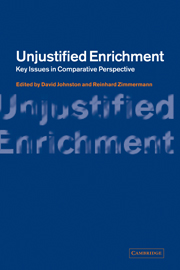Book contents
- Frontmatter
- Contents
- List of contributors
- Preface
- Table of cases
- List of abbreviations
- I Introduction
- II Enrichment ‘without legal ground’ or unjust factor approach
- III Failure of consideration
- IV Duress and fraud
- V Change of position
- VI Illegality
- VII Encroachment and restitution for wrongs
- 12 Reflections on the role of restitutionary damages to protect contractual expectations
- 13 Encroachments: between private and public
- VIII Improvements
- IX Discharge of another person's debt
- X Third-party enrichment
- XI Proprietary issues
- XII Taxonomy
- Index
13 - Encroachments: between private and public
Published online by Cambridge University Press: 31 July 2009
- Frontmatter
- Contents
- List of contributors
- Preface
- Table of cases
- List of abbreviations
- I Introduction
- II Enrichment ‘without legal ground’ or unjust factor approach
- III Failure of consideration
- IV Duress and fraud
- V Change of position
- VI Illegality
- VII Encroachment and restitution for wrongs
- 12 Reflections on the role of restitutionary damages to protect contractual expectations
- 13 Encroachments: between private and public
- VIII Improvements
- IX Discharge of another person's debt
- X Third-party enrichment
- XI Proprietary issues
- XII Taxonomy
- Index
Summary
The egg-washing machine
The celebrated case of Olwell v. Nye & Nissen has become one of the legends of the law of restitution. Olwell sold his interest in an egg-packing corporation to Nye & Nissen. By the terms of the sale, he was to retain full ownership in an egg-washing machine formerly used by that corporation. Olwell stored the machine in a space adjacent to the premises occupied by Nye & Nissen. Nye & Nissen, without Olwell's knowledge or consent, took the egg-washer out of storage and used it for the next three years in the regular course of its business. Olwell was not materially damaged, since the egg-washing machine was not injured by Nye & Nissen's operation during that period, and Olwell never claimed any title to it. Hence, Olwell sued Nye & Nissen in quasi-contract, waiving his conversion suit. He sought to recover the profits that inured to Nye & Nissen as a result of its wrongful use of the machine.
The Supreme Court of Washington held that, though no material harm had been done, Nye & Nissen was none the less liable for the benefit it had captured. More precisely, given the scarcity of labour immediately after the outbreak of World War II, the Court held that the captured benefit itself was the amount Nye & Nissen saved in labour costs by using Olwell's machine.
In a recent paper, Professor Ernest Weinrib severely criticised the Olwell Court. In Weinrib's view the Court committed two interrelated conceptual errors.
- Type
- Chapter
- Information
- Unjustified EnrichmentKey Issues in Comparative Perspective, pp. 348 - 366Publisher: Cambridge University PressPrint publication year: 2002



